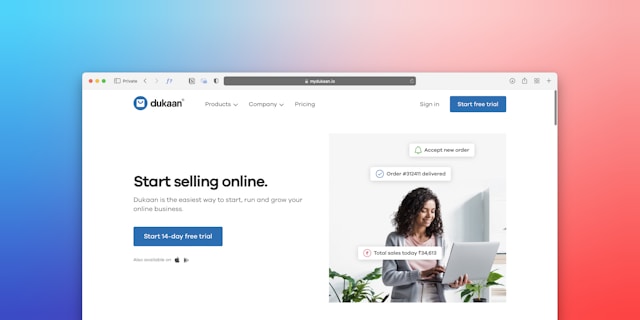How to Grow a Service-Based Business (20 Tips)

For service-driven businesses, from tech consultancies to creative agencies, growth isn't optional—it's essential for staying in the game. If you're a business owner at the beginning of your journey or looking to take your enterprise to the next level, knowing how to expand effectively is key. In this post, we'll break down a straightforward, actionable guide to elevate your service-based business. Get ready to explore strategies that turn obstacles into stepping stones for your business's growth.
Proven Techniques for Expanding a Service-Oriented Business
Ready to watch your business soar? See these battle-tested strategies that have helped service companies thrive:
- Be the Best. Focus on Less
- Tech-Enable Your Service for Scale
- Upsell with Extra Value
- Turn Clients into Advocates with a Referral Program
- Offer Promotions or Discounts
- Implement a Customer Loyalty Program
- Seek Out Strategic Business Partnerships
- Attend Industry Events
- Leverage Customer Feedback & Case Studies
- Increase Your Online Presence
- Optimize Your Website for Search Engines
- Track Variable Costs
- Measure Team Members Performance
- Calculate Customer Lifetime Value
- Utilize Email Marketing Campaigns
- Offer Free Trials or Demo
- Provide Educational Resources
- Don't Overextend Yourself
- Keep Your Employees Happy & Productive
- Learn from Your Competitors
1. Be the Best. Focus on Less
Don’t offer more—offering the best. Hone in on your standout service, the one thing you can do not just well, but exceptionally. This focused approach not only boosts the quality of your offering but also streamlines your resource allocation, ensuring every dollar and every hour contributes to enhancing your expertise.
Narrowing your focus sharpens your brand, making it clear to clients why you're the top choice in your field. It transforms your team into specialists, fostering innovation and expertise. Embrace this strategy to differentiate your business and drive sustainable growth.
2. Tech-Enable Your Service for Scale
Leveraging the right technological tools can be the difference between struggling to keep up with demand and scaling your business efficiently. Technology can automate repetitive tasks, improve communication with clients, and provide insights into your business performance.
For example, project management software like Jira or Trello can help keep your team organized and on track, ensuring that projects are delivered on time and within budget. CRM systems, such as Salesforce or HubSpot, can manage client interactions, helping you maintain a high level of service while also identifying opportunities for upselling or cross-selling.

Moreover, technology can enable your business to offer new, innovative services. For instance, adopting AI and machine learning can offer predictive insights into customer behavior, allowing for more personalized service offerings.
Investing in technology, however, should be a strategic decision. It's crucial to assess your business's needs and specific challenges. The goal is not to adopt technology for the sake of being modern but to choose tools that offer tangible benefits to your business and your clients. This might involve consulting with IT professionals, conducting a cost-benefit analysis, and gradually integrating new systems to ensure they align with your business processes and goals.
3. Upsell with Extra Value
Effective upselling is a win-win, boosting your bottom line while enriching your clients' experience with added value. This approach involves identifying complementary services or products that can augment the primary service your client is already purchasing.
For instance, if you are a web development agency, you might offer website maintenance and security as an upsell. Or, if you specialize in SEO, consider upselling content creation services.
The key is to ensure that these additional offerings are not just related but genuinely useful. If you master the balance between upselling and the technique from the first point, you will significantly enhance the client's experience and the effectiveness of your core service.
4. Turn Clients into Advocates with a Referral Program
A well-structured referral program can transform satisfied clients into a powerful marketing force. Word-of-mouth referrals are incredibly valuable in the service industry, where trust and reliability are paramount. By implementing a strategic referral program, you empower your clients to become ambassadors of your brand, sharing their positive experiences and, in turn, amplifying your reach.
Crafting an effective referral program requires thoughtful consideration. The rewards you offer for referrals should not only entice your clients into action but also be viable for your business's long-term growth. Options might include service discounts, cash rewards, or exclusive perks. The goal is to create the scenario where your clients feel valued for their endorsements, fostering a community of loyal advocates for your brand.
5. Offer Promotions or Discounts
Implementing promotions or discounts can serve as a catalyst for attracting new clients. This strategy can create a sense of urgency, encouraging clients to take action, whether it's signing up for a service or purchasing a product.
For service-based businesses, these promotions include a percentage off the first month of a subscription service, a reduced price for a bundled service package, or a free additional service with purchase.
6. Implement a Customer Loyalty Program
A customer loyalty program rewards repeat business, encouraging your clients to continue choosing your services over the competition. Effective loyalty programs can significantly enhance customer retention rates and increase lifetime value. The key is to design a program that offers real value to your clients, making their continued patronage feel appreciated and rewarded.
Options for loyalty rewards can vary widely, from exclusive access to new services to rewards based on a points system where points can be exchanged for services or products. The choice of rewards should align with your clients' interests and the nature of your services.
7. Seek Out Strategic Business Partnerships
Strategic business partnerships can unlock new growth avenues for service-based businesses. By collaborating with companies that offer complementary services, you can provide more comprehensive solutions to your clients, increase your market reach, and share resources for mutual benefit. For example, an accounting firm might partner with a legal consultancy specializing in business law to offer a comprehensive business startup package.
8. Attend Industry Events
Attending industry events, such as conferences, seminars, and trade shows, is a valuable strategy for growing your service-based business. These events offer numerous opportunities for networking, learning about the latest industry trends, and showcasing your expertise.
To maximize the benefits of attending industry events:
- Plan your participation strategically.
- Set clear objectives for what you want to achieve, such as specific people you want to meet, the knowledge you wish to gain, or the exposure you want.
- Follow up promptly with contacts you make, reinforcing the connections and exploring potential opportunities for collaboration.
9. Leverage Customer Feedback & Case Studies
Customer feedback is invaluable for service-based businesses. It offers insights into what you're doing right and where you can improve. Actively seeking and responding to feedback demonstrates your commitment to customer satisfaction and continuous improvement.
Case studies are powerful marketing tools that showcase your success stories. They provide concrete examples of how your services have helped clients achieve their goals, offering potential clients a glimpse of what they can expect.
Develop case studies highlighting your clients' challenges, the solutions you provided, and the results achieved. Share these stories on your website, marketing materials, and social media to attract new business and build your brand's credibility.
10. Increase Your Online Presence
Key components are a polished website, vibrant social media engagement, and compelling content marketing. Your digital presence often serves as the initial interaction point with potential clients, underscoring the importance of presenting a professional and inviting image online.
Focusing on these areas helps attract new clients and build a community around your brand, establish authority in your industry, and provide valuable information and insights to your audience. Whether it’s through insightful blog posts, interactive social media content, or a user-friendly website, strengthening your online presence is a crucial step toward growth and visibility in the competitive digital marketplace.
11. Optimize Your Website for Search Engines
For your service-based business to rank higher in search results and attract more clients, focus on strategic SEO practices. Incorporate targeted keywords, create high-quality content, and optimize your website’s design for a superior user experience. Pay attention to technical aspects like quick load times and ensuring your site is mobile-friendly.
Use tools like Google Analytics for a clear view of your website's performance, helping you identify and refine areas that need improvement. Through dedicated SEO efforts, your business will not only become more visible online but also establish itself as a leading choice in your field.
12. Track Variable Costs
To enhance profitability in your growing service-based business, precisely track and manage variable expenses, like outsourcing fees or material costs, which escalate with increased business volume.
Implementing cost-tracking software or financial management tools can provide real-time insights, enabling you to adjust spending proactively and maintain a healthy profit margin.
13. Measure Team Members Performance
Your team's performance is directly linked to your business's success. Establish clear performance metrics that align with your business goals and regularly review these with your team. It helps to identify areas for improvement and recognize high performers.
A performance management system can streamline this process, providing a structured framework for evaluations, feedback, and development plans. Encouraging open communication and providing opportunities for professional development can also enhance team performance and morale.
14. Calculate Customer Lifetime Value
Customer lifetime value (CLV) represents the total revenue you can expect from a customer over the duration of their relationship with your business. Calculating CLV helps you determine how much you can spend on acquiring new clients while maintaining profitability.
To calculate CLV, you need to consider the average purchase value, the number of transactions per year, and the average retention time for a customer. By increasing any of these variables, you can significantly boost the CLV of your clients.
15. Utilize Email Marketing Campaigns
Email marketing lets you deliver personalized content directly to your audience, informing them about your services, industry insights, promotions, and more.
To leverage email marketing effectively, segment your email list based on customer interests, behaviors, and where they are in the buyer's journey. This segmentation enables you to tailor your messages to meet different audience segments' specific needs and preferences, increasing engagement and conversion rates.
16. Offer Free Trials or Demo
Free trials or demos of your service can significantly lower the entry barrier for potential clients. It allows them to experience firsthand the value your service can provide without any financial commitment. Free trials are particularly effective for SaaS businesses or other service models where the value proposition is best understood through direct experience.
17. Provide Educational Resources
Offering educational resources such as tutorials, e-books, or blog posts positions your business as a knowledgeable leader in your industry. These resources can help solve common problems your target audience faces, build trust, and establish a connection with potential clients. Moreover, they serve as a soft introduction to your services, showcasing your expertise and the potential value you can provide.
18. Don't Overextend Yourself
As your service-based business grows, it's tempting to take on more than you can handle in the pursuit of revenue. However, overextension can lead to burnout, decreased service quality, and unsatisfied clients. Focus on sustainable growth strategies that allow you to maintain the quality of your service while expanding your client base gradually.
19. Keep Your Employees Happy & Productive
Your employees are the backbone of your service-based business. A happy and productive team is essential for delivering the exceptional service your clients expect. Invest in your team's development, offer competitive benefits, and foster a positive work environment. Recognizing their hard work and contributions will not only boost morale but also loyalty and productivity.
20. Learn from Your Competitors
Monitoring and learning from your competitors can provide valuable insights into market trends, effective strategies, and areas where your business can improve or differentiate. Analyzing your competitors' offerings, marketing tactics, customer service approach, and online presence can reveal strengths and weaknesses in your own business.
However, learning from competitors doesn't mean imitating them. Instead, use this information to innovate and offer something unique to your clients. Identify gaps in your competitors' offerings or service delivery that you can capitalize on to provide additional value to your clients.
The Final Word
Growing a service-based business requires a multifaceted approach, focusing on both attracting new clients and nurturing existing relationships. By implementing these proven strategies, you can enhance service quality, streamline operations, and establish a strong brand presence.
Remember, sustainable growth is a marathon, not a sprint. It requires patience, persistence, and a continuous effort to adapt and innovate.
Frequently Asked Questions About Service-Based Businesses
Begin scaling your business when you have a solid client base, a clear value proposition, and the operational capabilities to handle increased demand without compromising service quality.
Key metrics include revenue growth, client retention rates, customer acquisition costs, employee productivity, and client satisfaction scores. Monitoring these metrics will give you a comprehensive view of your business's health and growth trajectory.
Assess the impact and urgency of each task to prioritize your workload. Focus on high-value activities that directly contribute to client satisfaction and revenue growth. Project management tools can help you organize and delegate tasks efficiently.
